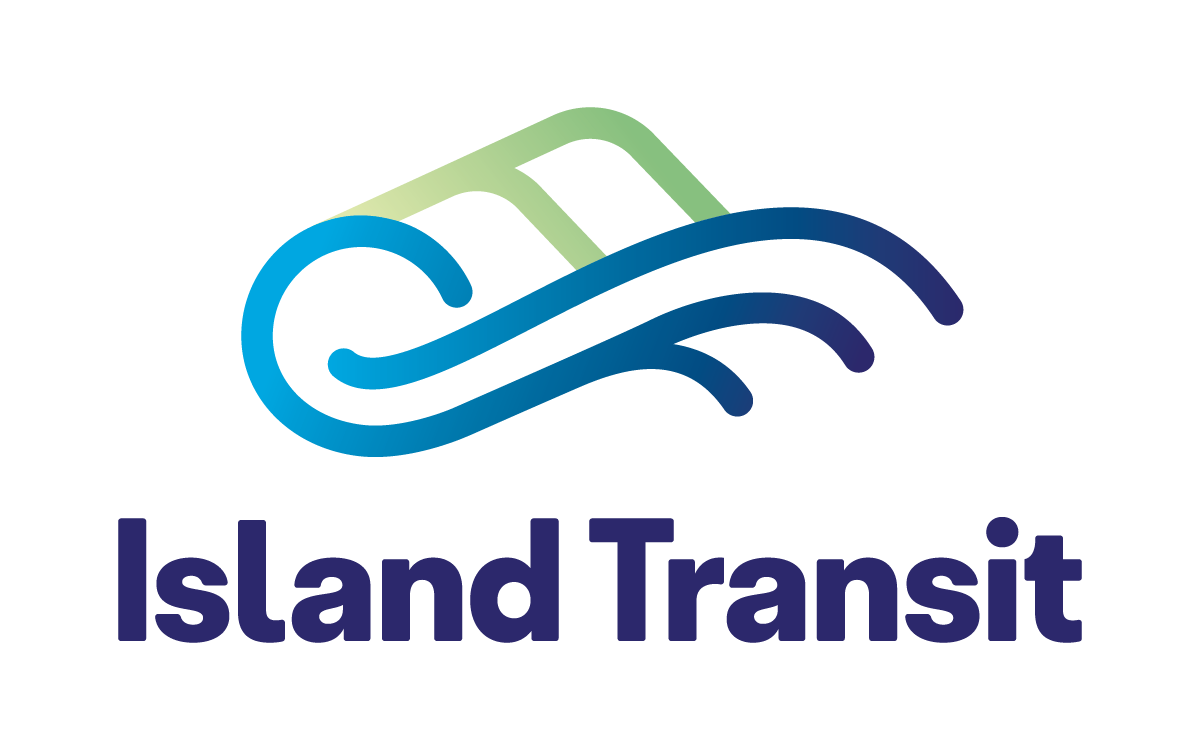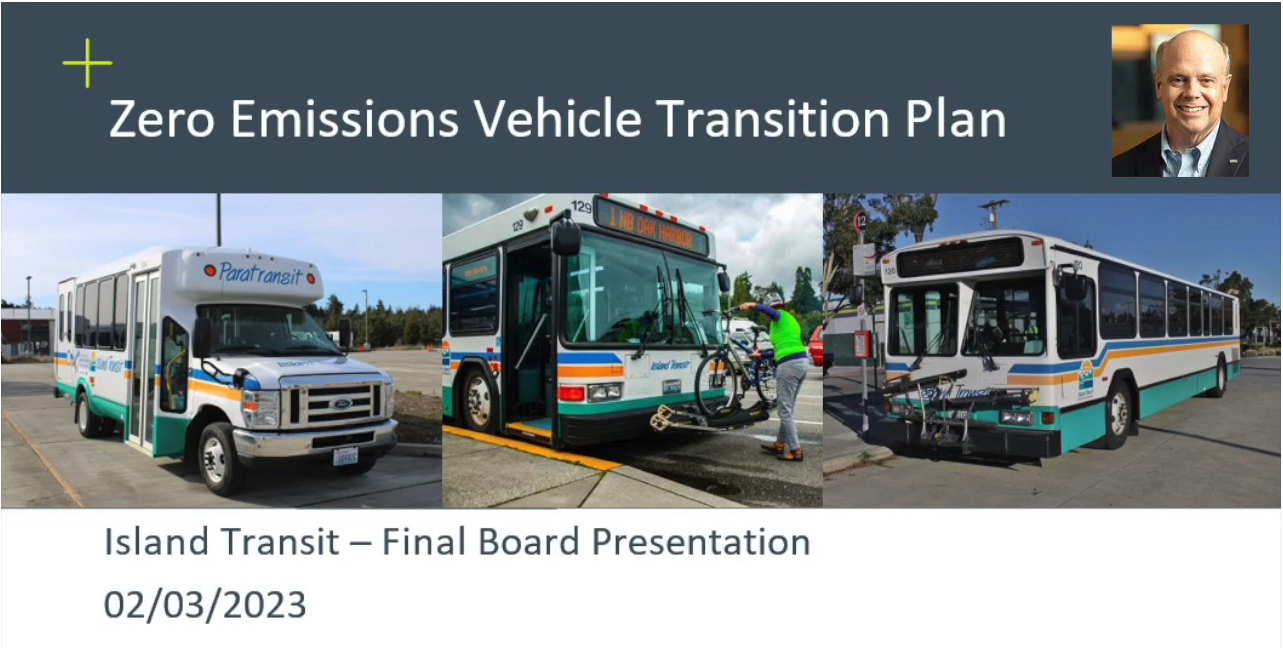
Transition to Zero Emissions - ZEBPRO
Island Transit Board of Directors Approves Implementation of Proposed Zero Emissions Transition Plan
Click here for the FINAL Zero Emission Fleet Feasibility plan.
On Friday, March 3, 2023, during Island Transit’s Board Meeting, the Board of Directors approved the implementation of the proposed zero emissions transition plan. The board’s approval sets in motion the agency’s plan to the decarbonization of the fleet by 2035.
Since August of 2022, the agency, working with Hatch LTK, a consulting firm specializing in public transit zero emissions vehicle and systems engineering, evaluated and identified the available zero emission technology, including the renewable nature of the energy required, the reliability and availability of that energy, and the infrastructure needed to support new buses.
In addition to the study conducted by Hatch LTK, the agency has spent the last several years researching best practices, interviewing experts in zero emissions technologies, attending webinars and conferences, and visiting several other transportation agencies in the Pacific Northwest utilizing these technologies.
“This transition plan allows the agency to move toward a zero emissions fleet while we continue to deliver expanded and new transit services to better serve its community members,” states Beth Munns, Board of Directors President, and City of Oak Harbor Councilmember.
Whidbey and Camano Island bus services operate in a unique rural environment as compared to urban transit agencies with access to larger infrastructures. The transition plan outlined technologies that would accommodate the islands’ environmental and technological constraints including sustained power outages and daily 300 plus mile routes. This in-depth study also addressed the topology, elevation, weather, frequency of stops, and other factors affecting energy consumption of the current fleet as the baseline to determine what zero propulsion technologies can support the service routes. The recommended technologies include a combination of all-electric and hydrogen fuel cell propulsion systems.
“The combination of fuel propulsion systems reduces the geographic and infrastructural barriers that would limit services to our community members,” states Todd Morrow, Island Transit Executive Director, “This transition will occur in a phased approach and serve as the guide to future vehicle purchases.”
Island Transit has already taken steps toward transitioning the entire fleet away from fossil-fueled vehicles. The agency added five battery electric vehicles to their rideshare program as well as placed in service 18 alternative fuel vehicles to its fleet including three electric Hybrid Gilligs and 15 Propane Cutaways.
Island Transit continues to support a sustainable, clean transportation future with renewable energy solutions.
Island Transit Zero Emissions Presentation 2023 at 03/03/2023 Board Meeting
Click here for the video presentation:
Thank you for your interest in Island Transit ZEBPRO, the zero emission bus project. Island Transit is committed to reducing our agency’s carbon footprint while we continue to help you reduce yours. As we progress with our zero emission feasibility study we are seeking your input. We have several options we are exploring for how to implement the transition to zero emissions equitably. We have created a survey to provide a better understanding of the options our agency is considering while offering you, as part of the community, an opportunity to provide feedback.
We have completed the survey and currently working on compiling the results. Thanks to everyone who prticipated!
Additional background information is posted below - updates will be posted as the project progresses.
Zero Emission Feasibility Study
Island Transit began a zero emission feasibility study in August 2022.
This in-depth feasibility study is evaluating the available zero emission technology, including the renewable nature of the energy required, the reliability and availability of that energy, and the infrastructure needed to support new buses. Whidbey and Camano Island bus services operate in a unique rural environment as compared to urban transit agencies with access to larger infrastructures. The selected technology must accommodate those environmental and technological constraints including sustained power outages and daily 300 plus mile routes. Options include all-electric or hydrogen fuel cell, or a combination of both propulsion systems.
This study will produce a fleet transition plan that will guide future vehicle purchases and also satisfy the agency’s commitment to the Federal Transit Administration’s (FTA) “Sustainable Transit for a Healthy Planet Challenge”. The challenge supports President Biden’s goal for the U.S. to reduce net Greenhouse Gas Emissions (GHG) pollution by 50-52 percent from 2005 levels. To meet the challenge, Island Transit will develop a climate action or sustainability plan that details GHG reduction strategies.
The zero emission feasibility study builds on the work we completed with the Route Network Analysis which was the first step for accurately assessing the performance of zero emission vehicles on a route and understanding how a vehicle’s capabilities align with the route’s service requirements. This information, as well as topology, elevation, weather, frequency of stops, and other factors affecting energy consumption of the vehicle will be used as the baseline to determine what zero propulsion technologies can support the service routes.
Island Transit Zero Emissions Presentation 2023 at 02/03/2023 Board Meeting
Current Fleet Status
This past year as part of Island Transit’s transition to zero emission vehicles, the agency received a grant to purchase five battery electric vehicles. These vehicles have been delivered. In addition, the agency added and placed in service 18 alternative fuel vehicles to its fleet including three electric Hybrid Gilligs and 15 Propane Cutaways. While the current fleet already affords community members who use Island Transit’s services a significant reduction in their carbon footprint, transitioning the entire fleet away from fossil-fueled vehicles will significantly reduce the agency’s footprint as well.
Remember - taking the bus is a better choice for the environment than driving single occupancy vehicles. If you haven't taken the bus and want to give it a try - call us 360-678-7771! Our friendly dispatchers are always happy to assist in planning your route.
Join our mailing list
Want to keep informed about the progress of Island Transit ZEBPRO? Sign up!
Have a question or want to drop a comment by email? Feel free to send your input to zebpro@islandtransit.org.




